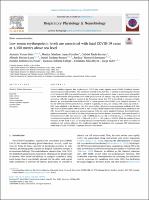Low serum erythropoietin levels are associated with fatal Covid-19 cases at 4,150 meters above sea level
Related Resource(s)
https://www.sciencedirect.com/science/article/pii/S156990482100094X?via%3DihubDate
2021-05-30Author(s)
Viruez Soto, Antonio
López Dávalos, Mónica Marlene
Rada Barrera, Gabriel
Merino Luna, Alfredo
Molano Franco, Daniel
Tinoco Solórzano, Amilcar
Zubieta DeUrioste, Natalia
Zubieta Calleja, Gustavo
Arias Reyes, Christian
Soliz, Jorge
Metadata
Show full item recordAbstract
Previous studies suggested that erythropoietin (EPO) may protect against severe COVID-19-induced injuries,
ultimately preventing mortality. This hypothesis is based on the fact that, in addition to promoting the increase
in red blood cells, EPO is an anti-inflammatory, anti-apoptotic and protective factor in several non-erythropoietic
tissues. Furthermore, EPO promotes nitric oxide production in the hypoxic lung and stimulates ventilation by
interacting with the respiratory centers of the brainstem. Given that EPO in the blood is increased at highaltitude,
we evaluated the serum levels of EPO in critical patients with COVID-19 at “Hospital Agramont” in
the city of El Alto (4150 masl) in Bolivia. A total of 16 patients, 15 men, one woman, with a mean age of 55.8 ±
8.49 years, admitted to the Intensive Care Unit were studied. All patients were permanent residents of El Alto,
with no travel history below 3000 masl for at least one year. Blood samples were collected upon admission to the
ICU. Serum EPO concentration was assessed using an ELISA kit, and a standard technique determined hemoglobin
concentration. Only half of the observed patients survived the disease. Remarkably, fatal cases showed 2.5
times lower serum EPO than survivors (2.78 ± 0.8643 mU/mL vs 7.06 ± 2.713 mU/mL; p = 0.0096), and 1.24
times lower hemoglobin levels (13.96 ± 2.56 g/dL vs 17.41 ± 1.61 g/dL; p = 0.0159). While the number of cases
evaluated in this work is low, our findings strongly warrant further investigation of EPO levels in COVID-19
patients at high and low altitudes. Our results also support the hypothesis that exogenous EPO administration
could help critically ill COVID-19 patients overcome the disease.






